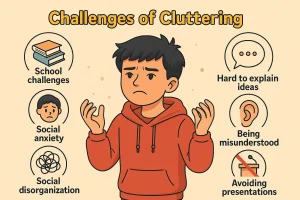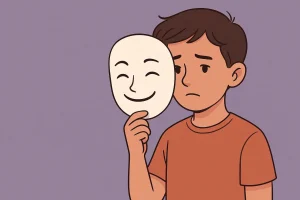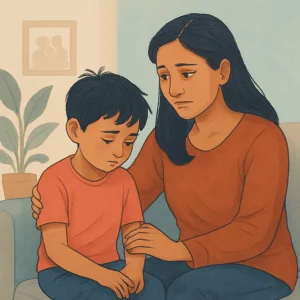Why Sleep Matters for Your Child’s Focus and Attention
By Wellness Hub
Last Updated: September 20, 2024
Sleep is not just a time when kids rest; it’s a crucial part of their growth and development. Imagine your child’s brain as a busy city—during the day, it’s full of activities, learning, and exploring new things. But at night, sleep comes in like the city’s cleanup crew, sorting through everything, storing memories, and getting rid of unnecessary clutter. This “cleanup” is essential because it helps your child’s brain work better the next day, especially when it comes to focusing and paying attention.
When children get enough sleep, they wake up refreshed and ready to take on new challenges. They can concentrate better in school, remember what they’ve learned, and handle tasks with ease. On the flip side, if they don’t get enough rest, it’s like their brains are stuck in traffic—sluggish, distracted, and easily overwhelmed. This can make it hard for them to stay focused, follow directions, or even enjoy their favorite activities.
Also read: Simple Time Management Tricks for Kids to Stay Focused
How Sleep Helps the Brain
Have you ever noticed how much better your child performs after a good night’s sleep? That’s because sleep isn’t just downtime—it’s when their brain gets to work, helping them learn and remember all the things they’ve experienced throughout the day. Imagine sleep as your child’s personal tutor, sorting through the day’s lessons and making sure everything sticks.
When kids sleep, their brain is busy organizing and storing information, almost like saving files on a computer. This is crucial for learning because it makes recalling information later so much easier. For example, if your child learned something new at school, good sleep helps lock in that knowledge, making it easier for them to remember it during a test or while doing homework. This process is called memory consolidation, and it’s one of the key reasons why sleep is so vital for children’s learning and overall development.
What Happens When Kids Don’t Get Enough Sleep
Have you ever noticed your child having trouble paying attention or seeming extra cranky after a late night? It’s not just a coincidence—when kids don’t get enough sleep, it affects much more than their mood. Poor sleep can have a direct impact on how they perform in school, how they behave, and how they feel overall.
One of the first signs of not getting enough sleep is trouble focusing. You might see your child easily distracted, unable to stay on task, or simply zoning out during conversations or schoolwork. It’s like their brain is running on low battery, making it hard to keep up with daily demands. This lack of focus can lead to missed instructions, forgotten assignments, and an overall struggle to keep up with their classmates.
Alongside attention issues, poor sleep often brings irritability and mood swings. A normally cheerful child might become cranky, tearful, or overly sensitive. It’s as if their emotional “shield” is thinner, making it tougher to handle everyday frustrations. This can affect not just their school performance but also their relationships with friends and family.
Sleep deprivation doesn’t just make kids tired—it can actually make it hard for them to do well in school. Studies show that children who don’t get enough sleep often have lower grades, difficulty with problem-solving, and a harder time managing tasks that require critical thinking. It’s not that they aren’t capable; it’s that their brains aren’t operating at full capacity.
Also read: Things You Should Avoid to Sleep Better
Benefits of Good Sleep for Focus
Getting enough sleep isn’t just about feeling rested—it plays a crucial role in helping kids focus and thrive throughout their day. Imagine trying to solve a puzzle with missing pieces; that’s what it’s like for a child trying to concentrate without enough sleep. When kids get the right amount of rest, their brains are fully charged and ready to tackle new information, follow instructions, and stay engaged.
One of the biggest benefits of good sleep is improved concentration. Well-rested children can focus on their tasks, whether it’s paying attention in class, reading a book, or playing a game. Sleep helps the brain process information more effectively, making it easier for kids to understand and remember what they learn. This enhanced concentration means they’re less likely to be distracted and more likely to complete tasks without frustration or frequent mistakes.
But it’s not just about focus; good sleep also helps kids manage their emotions and behavior. Think of sleep as a reset button for their mood. When children are well-rested, they are calmer, more patient, and better able to cope with everyday challenges. This emotional steadiness makes it easier for them to get along with others, whether it’s cooperating with classmates, sharing with siblings, or listening to parents.
Children who sleep well are also more resilient in social situations. They can handle conflicts and disappointments better, leading to more positive interactions and relationships. This aspect of sleep is especially important as it helps build a child’s social skills and confidence—two key components that go hand-in-hand with academic success.
Recommended Sleep Duration by Age
| Age Group | Recommended Sleep | Importance of Sleep |
|---|---|---|
| Infants (4-12 months) | 12-16 hours (including naps) | Sleep supports rapid growth and brain development, critical for achieving major cognitive and physical milestones. |
| Toddlers (1-2 years) | 11-14 hours (including naps) | Essential for developing motor skills, learning new words and actions, and managing emotions as they explore their world. |
| Preschool (3-5 years) | 10-13 hours per night | Promotes behavioral control, aids in memory retention, and helps stabilize mood, fostering a positive learning environment. |
| School-aged (6-12 years) | 9-11 hours per night | Enhances learning capabilities, improves focus and attention, and boosts emotional resilience amidst increasing academic and social challenges. |
| Teenagers (13-18 years) | 8-10 hours per night | Supports academic success, mood regulation, and physical growth; important for managing stress, social interactions, and developing independence. |
Tips for Better Sleep
Helping your child get better sleep doesn’t have to be complicated. With a few simple changes, you can create a bedtime environment that promotes restful sleep, leading to better focus and mood during the day. Here are some easy and practical tips to improve your child’s sleep quality:
1. Set a Bedtime Routine
Creating a consistent bedtime routine is one of the most effective ways to help your child wind down and prepare for sleep. Simple activities like reading a book, taking a warm bath, or listening to calm music can signal to your child that it’s time to relax. The goal is to establish a predictable sequence of events that ease them into sleep mode, making it easier for them to fall asleep and stay asleep through the night.
2. Keep the Bedroom Quiet, Dark, and Cool
The environment in which your child sleeps plays a significant role in how well they rest. Aim to keep their bedroom quiet, dark, and cool to create the ideal sleep setting. Use blackout curtains to block out light, consider a white noise machine or fan to reduce background noise, and set the room temperature to a cool, comfortable level. These adjustments can make a big difference in helping your child sleep more soundly.
3. Stick to a Regular Sleep Schedule, Even on Weekends
Consistency is key when it comes to sleep. Try to maintain the same bedtime and wake-up time every day, including weekends. This helps regulate your child’s internal clock, making it easier for them to fall asleep and wake up naturally. While it might be tempting to let them stay up late on weekends, keeping a regular schedule can prevent sleep disruptions that affect their focus and mood during the week.
4. Limit Screen Time Before Bed
The blue light emitted by screens on phones, tablets, and TVs can interfere with the production of melatonin, the hormone that helps regulate sleep. To promote better sleep, try to limit screen time at least an hour before bed. Instead of screen time, encourage quiet activities like reading or drawing to help your child relax without the stimulating effects of screens.
Common Sleep Problems and Solutions
It’s not uncommon for kids to face sleep challenges. Whether it’s struggling to fall asleep, waking up frequently during the night, or resisting bedtime altogether, these issues can disrupt their rest and impact their ability to focus and learn during the day. The good news is that there are simple strategies that can help address these common sleep problems, setting your child up for better nights and brighter days.
Trouble Falling Asleep
One of the most common sleep issues kids face is difficulty falling asleep. This can be due to a variety of reasons, such as overstimulation before bed, anxiety, or even an irregular sleep schedule. If your child is lying awake long after lights out, try incorporating calming activities into their bedtime routine. Gentle options like reading a soothing story, listening to soft music, or practicing deep breathing exercises can help signal to their body that it’s time to wind down. Creating a consistent, relaxing routine can be incredibly effective in easing your child into sleep mode.
Bedtime Resistance
Many children push back against bedtime, finding endless reasons to stay up just a little bit longer. This resistance is often a sign of not feeling ready for bed or wanting to spend more time with family. To combat this, make bedtime a positive experience by allowing your child to have some control over their routine. Letting them choose a book to read or picking out their pajamas can make them feel more involved and less resistant. Setting clear and consistent bedtime expectations, even on weekends, can also reduce pushback and create a smoother transition to sleep.
Frequent Night Wakings
Waking up during the night is another common sleep disruption that can leave your child feeling tired and unfocused the next day. This can be caused by discomfort, fear of the dark, or even needing to use the bathroom. If your child frequently wakes up, make sure their sleep environment is comfortable and secure—think cozy blankets, a nightlight if needed, and a clear path to the bathroom. Encourage them to try to fall back asleep on their own, which can be a helpful skill as they grow.
Difficulty Waking Up in the Morning
If mornings are a struggle, it could be a sign that your child isn’t getting enough restful sleep. To make wake-ups easier, ensure that your child is going to bed at an appropriate time that allows for enough sleep based on their age. Keeping the morning routine calm and consistent can also help make the transition from sleep to wakefulness smoother.
Conclusion
Sleep is a powerful tool that helps your child stay focused, learn better, and handle their emotions. A good night’s sleep is like hitting the reset button—it helps your child’s brain recharge, making it easier for them to pay attention in school, remember new things, and stay calm. Without enough sleep, your child might struggle to concentrate, feel more irritable, and find everyday tasks more challenging. By making sure your child gets enough sleep, you’re helping them be at their best, both in and out of the classroom.
Prioritizing sleep doesn’t have to be complicated. Simple actions like setting a regular bedtime, creating a calm and cozy sleep environment, and reducing screen time before bed can make a big difference. At Wellness Hub, we know that good sleep is key to your child’s success and happiness. Let’s make sleep a priority, so our kids can wake up ready to take on each day with focus and confidence!
Frequently Asked Questions:
1. How does sleep improve a child’s focus and attention?
Sleep helps the brain recharge and process information, making it easier for kids to concentrate, pay attention, and remember what they learn. A good night’s sleep ensures that your child is alert and ready to tackle daily tasks with better focus.
2. What are the signs that my child isn’t getting enough sleep?
Common signs of sleep deprivation in children include trouble focusing, irritability, frequent mood swings, and difficulty waking up in the morning. They may also struggle with following instructions or staying on task at school.
3. How much sleep does my child need for better focus and attention?
The amount of sleep needed varies by age, but generally, preschoolers need 10-13 hours, school-aged children need 9-11 hours, and teenagers need 8-10 hours of sleep each night. Ensuring your child gets enough sleep can greatly improve their ability to focus.
4. What can I do to help my child fall asleep faster?
Establishing a consistent bedtime routine, keeping the bedroom quiet, dark, and cool, and limiting screen time before bed are all effective ways to help your child fall asleep more easily. Calming activities like reading or listening to soft music can also promote better sleep.
5. Why is it important to have a regular sleep schedule for kids?
A regular sleep schedule helps regulate your child’s internal clock, making it easier for them to fall asleep and wake up at consistent times. This routine supports better sleep quality, which in turn boosts their focus and attention during the day.
6. How does screen time affect my child’s sleep?
Screen time, especially before bed, can interfere with the production of melatonin, the sleep hormone. Blue light from screens can make it harder for kids to fall asleep and stay asleep. Reducing screen use at least an hour before bedtime can help improve sleep quality.
7. What should I do if my child still has trouble sleeping?
If your child continues to have sleep issues despite following a good sleep routine, consider consulting a pediatrician or a sleep specialist. Persistent sleep problems can affect their focus, mood, and overall health, so seeking professional advice can be beneficial.
8. How can I make my child’s bedroom more sleep-friendly?
To create a sleep-friendly environment, keep the room quiet, dark, and cool. Use blackout curtains to block light, consider a white noise machine to reduce background noise, and set the room temperature to a comfortable level. A cozy bed with comfortable pillows and blankets can also make a big difference in helping your child relax and sleep better.
9. Can a lack of sleep affect my child’s school performance?
Yes, lack of sleep can significantly impact your child’s ability to perform well in school. It can lead to trouble concentrating, difficulty remembering lessons, and lower grades. Ensuring your child gets enough quality sleep can improve their focus, problem-solving skills, and overall academic performance.
10. What are some bedtime activities that can help my child relax?
Calming activities before bed can help signal to your child that it’s time to wind down. Consider reading a book, doing gentle stretches, practicing deep breathing, or listening to soothing music. These activities can help create a peaceful transition from the busyness of the day to a restful night’s sleep.
About Author:
Lasya Vooturi,
Clinical Psychologist (A) & Behavioral Therapist
Lasya holds a Professional Diploma in Clinical Psychology from Amity University, where she deepened her understanding of psychological principles from March 2023 to March 2024. With over a year of dedicated experience as a Behavioral Therapist, Lasya has honed her skills in applying effective therapy techniques tailored to individual needs. Fluent in Telugu, Hindi, and English, she is adept at connecting with a diverse range of clients, ensuring comprehensive communication and understanding. Lasya’s approach is grounded in empathy and scientific rigor, making her a trusted ally in navigating mental health challenges.
Book your Free Consultation Today
Parent/Caregiver Info:
Client’s Details:
* Error Message









